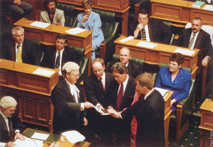|
|
:
Introduction
|
|
|
|
||
|
The assessments included fourteen tasks investigating students’ knowledge, understandings and processes in the area of social studies called social organisation. This area focuses on how people are organised in groups and the rights, roles and responsibilities of people as they interact within groups. Six tasks were identical for both year 4 and year 8, two were attempted only by year 4 students, and six only by year 8 students. Three are trend tasks (fully described with data for both 1997 and 2001), six are released tasks (fully described with data for 2001 only), and five are link tasks (to be used again in 2005, so only partially described here). The tasks are presented in the three sections: trend tasks, then released tasks and finally link tasks. Within each section, tasks administered to both year 4 and year 8 students are presented first, followed by tasks administered only to year 4 students and then tasks administered only to year 8 students. Averaged across 91 task components administered to both year 4 and year 8 students, 7 percent more year 8 than year 4 students succeeded with these components. Year 8 students performed better on 74 of the 91 components. The components with the largest differences were scattered across all of the tasks, as were the components on which year 8 students did not do better than year 4 students. Between 1997 and 2001, there was little change for year 4 students and a small decline for year 8 students. Averaged across 38 trend task components attempted by year 4 students in both years, 1 percent more students succeeded in 2001 than in 1997. Gains occurred on 21 of the 38 components. At year 8 level, with 17 trend task components included, 4 percent fewer students succeeded in 2001 than in 1997. Gains occurred on just 3 of the 17 components, with losses on 12 components. The students achieved quite a high level of consensus about the requirements for good team members and leaders, with strong emphasis on being encouraging, helpful and fair, and not trying to be too bossy or dominating. Year 8 students continued along these lines when they explored the rights and responsibilities of students and teachers. They believed they had a right to be treated kindly and fairly, and allowed reasonable freedom of expression, while their responsibilities included being respectful and helpful to the teacher, kind and fair to their fellow students, and trying hard as learners. They perceived the main right for teachers to be having students who paid attention, were respectful and not disruptive, and the main responsibilities to be well prepared, try hard as a teacher, treat children kindly and fairly, and try to make school a safe place. Performance was predictably lower on tasks that explored students’ understanding of aspects of social organisation that they would have more distant contact with, such as how community and national leaders win their positions, the challenges associated with disability, and steps in proposing and implementing new laws. |
|||||

